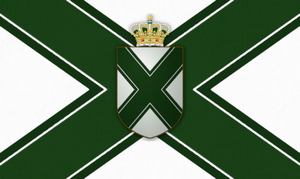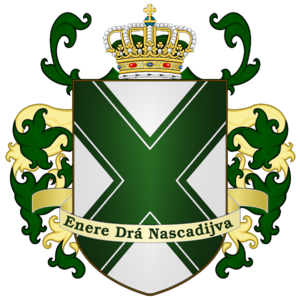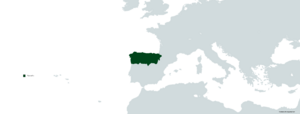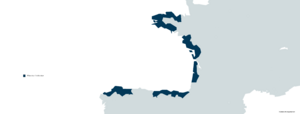Nascadia: Difference between revisions
(Nascadia) |
m (Nascadia) |
||
| (2 intermediate revisions by the same user not shown) | |||
| Line 140: | Line 140: | ||
===Prehistory=== | ===Prehistory=== | ||
[[File: | [[File:Nascadian Prehistoric Paintings.jpg|thumb|{{wp|Cave art}} from Kujondare, Gisokinia, dated to 17,000 BC]] | ||
Various species of {{wp|hominids}} lived in Nascadia as early as 1.5 million years ago. The oldest attested Nascadian inhabitants that belonged to the | Various species of {{wp|hominids}} lived in Nascadia as early as 1.5 million years ago. The oldest attested Nascadian inhabitants that belonged to the genus Homo is the archaic Homo antecessor, whose fossils have been found in Vostolina, Balasunia, and other places around the Drayver Ocean. Homo erectus migrated into Nascadia from Busceybia and Atesia. Sometime around 150,000 BC, Homo neanderthalensis (Neanderthals) appeared around Port Bravo in Deshiobia. The Neanderthals disapeared sometime around 28,000 BC. The first Homo Sapiens fossils were found in the town of Poatra, Kresonidia, which date back to the year 30,000 BC, 2,000 years before the Neanderthals disapeared "mysteriously". | ||
===Classical antiquity=== | ===Classical antiquity=== | ||
[[File:Whuzrieq Civilization Map.png|thumb|Map of the Whuzrieq Civilization at its peak extent (750 BC)]] | |||
During the Classic Era, the first nations, such as the Whurzieq Civilization and the Drasbice Dynasty were created. | |||
===Middle Ages=== | ===Middle Ages=== | ||
During the Middle Ages, a giant empire, under the name of Scorchia, ruled all of Nascadia and many other lands around. | |||
===Early modern period=== | ===Early modern period=== | ||
| Line 187: | Line 188: | ||
| style="background:#ffeb99; color:black"| Constitutional Parliamentary Monarchy | | style="background:#ffeb99; color:black"| Constitutional Parliamentary Monarchy | ||
|- | |- | ||
| {{flagicon image|}} [[ | | {{flagicon image|Celtiadian Flag.png}} [[Celtiadia]] | ||
| {{flagicon image| | | {{flagicon image|Surussian Flag (Surusse).png}} [[Surusse]] | ||
| 11,384,499 | | 11,384,499 | ||
| 46,789 | | 46,789 | ||
| | | Urcana Vegnas | ||
| | | Hedefle Gawai | ||
| style="background:#ffeb99; color:black"| | | style="background:#ffeb99; color:black"| Demarchy | ||
|} | |} | ||
Latest revision as of 09:13, 10 December 2023
The Glorious Republican Kingdom of Nascadia Stakaza abó Nascadijva (Republic of Nascadia) or Jehastas abó Nascadijva (Kingdom of Nascadia) | |
|---|---|
| Motto: ¡Enere drá Nascadijva! All for Nascadia! | |
| Anthem: ¡Manitoba! (Freedom!) | |
| Status | Independent |
| Capital | Rohontho |
| Largest | Kincardine |
| Official languages | Nascadian and English |
| Recognised national languages | Nascadian, English and Spanish |
| Recognised regional languages | Nascadian, English, Spanish, German, French, Brookish and Oskyrian |
| Ethnic groups (2023) | Alynl (89%)
Fletznig (7%) Gekon (4%) |
| Religion (2022) | Brucinism |
| Demonym(s) | Nascadian |
| Government | Constitutional Monarchy |
• Monarch | King Andrew I |
• Prime Minister | Kevin Wormley |
| Legislature | Parliament |
| Senate | |
| Establishment | |
• First Nascadian Revolution | 2014-2018 |
• First Nascadian Independence | 2019-2021 |
• Cutraycian Occupation of Nascadia | 2021-2022 |
• Second Nascadian Independence | 2022-Present |
| HDI (2023) | 0.91 very high |
| Currency | Nascadian Kudas (NK) |
| Date format | Day/Month/Year |
| Driving side | left |
| Calling code | +957 |
| Internet TLD | .ns |
Etymology
The name Nascadia comes from the ancient Craabbash word "Ѝαḉæḭд", which means "land of the noble men".
History
Prehistory

Various species of hominids lived in Nascadia as early as 1.5 million years ago. The oldest attested Nascadian inhabitants that belonged to the genus Homo is the archaic Homo antecessor, whose fossils have been found in Vostolina, Balasunia, and other places around the Drayver Ocean. Homo erectus migrated into Nascadia from Busceybia and Atesia. Sometime around 150,000 BC, Homo neanderthalensis (Neanderthals) appeared around Port Bravo in Deshiobia. The Neanderthals disapeared sometime around 28,000 BC. The first Homo Sapiens fossils were found in the town of Poatra, Kresonidia, which date back to the year 30,000 BC, 2,000 years before the Neanderthals disapeared "mysteriously".
Classical antiquity
During the Classic Era, the first nations, such as the Whurzieq Civilization and the Drasbice Dynasty were created.
Middle Ages
During the Middle Ages, a giant empire, under the name of Scorchia, ruled all of Nascadia and many other lands around.
Early modern period
W.I.P
Modern period
W.I.P
Geography
W.I.P
Politics
W.I.P
List of states and territories
| Name | Capital | Population | Area (km²) | Head of State | Head of Government | Government type |
|---|---|---|---|---|---|---|
| 11,384,499 | 46,789 | Ibrion Kyrnith | Yozel Malucus | Democratic republic | ||
| 11,384,499 | 46,789 | Dryline Potzga | Sadon Trionan | Constitutional Parliamentary Monarchy | ||
| 11,384,499 | 46,789 | Urcana Vegnas | Hedefle Gawai | Demarchy |



